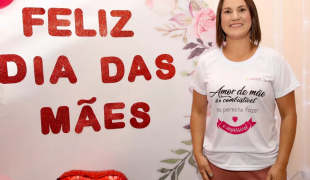- 2906
- 243
- 4
- 3
- 0
- Help Ukraine
About the solution
Therese Ojibway, a devoted mother with a passion for fairy tales and a childhood filled with magic, turned a simple forest walk into a journey of creation and healing. Her inspiring story takes us from the calm woods of Millburn, New Jersey, to an enchanted kingdom where imagination flourishes and the community comes together around a noble cause.
Raised in Minnesota, in a large family of 10 siblings, Ojibway grew up surrounded by stories of "little houses, little things, little people." From an early age, she nurtured a fascination with the fables and legends that populated her imagination, leaving small notes and food in hidden nooks for the supposed mystical inhabitants of the forests.
One day, while hiking near her home in New Jersey, Ojibway came across a hollow in a tree that caught her eye. This magical moment stirred memories of her childhood and prompted her to ponder the possibility of bringing some of the magic from her youthful tales into real life. Motivated by this vision, she embarked on a journey of creation that would change not only her life but that of many others.
With her son, Clinton Craig, diagnosed with autism at the age of three, Ojibway imagined ways to provide him with a safe and stimulating environment. Thus, the Fairy Trail was born, a magical path filled with fairy houses and wonders of nature. For Clinton, the experience of exploring this enchanted world was not only fun but also therapeutic, providing him with a deep connection to nature and stimulating his imagination.
What started as a personal project quickly became a community cause. With the support of the South Mountain Conservancy and dedicated volunteers, the Fairy Trail grew and became a meeting point for families and nature lovers. Ojibway's dedication to sharing her magical vision not only transformed her son's life but also enriched the experience of an entire community.
Source of information: https://www.washingtonpost.com/lifestyle/2024/03/28/south-mountain-fairy...
Contact information: linkedin.com/in/therese-ojibway-81817921
这些解决方案不应包括使用药物,化学品或生物制品(包括食品);创伤性设备;冒犯性的,商业或内在危险的内容。该解决方案未经医学验证。请谨慎进行!如果您有任何疑问,请咨询健康专家。
DISCLAIMER: This story was written by someone who is not the author of the solution, therefore please be advised that, although it was written with the utmost respect for the innovation and the innovator, there can be some incorrect statements. If you find any errors please contact the patient Innovation team via info@patient-innovation.com
-
-
627
-
0
-
10527

Fighting dementia with flowers and activities
COMMUNICATION: Communicating, whether by speaking, listening, or other means
CAREGIVING
Gardening
Social interaction
Alzheimer's Disease
Educational/Leisure device (book, toy, game...)
Strategy/Tip
Memory loss
Confusion
Mood swings
Depression or anxiety
Fatigue
Promoting self-management
Managing Neurological Disorders
Building Supportive Community Relationships
Promoting inclusivity and social integration
Raise awareness
Caregiving Support
General and Family Medicine
Neurology
Psychiatry
United States
-
-
-
373
-
0
-
4046

After losing son to rare disease, woman creates project to help mothers with children with special needs
CAREGIVING
COMMUNICATION: Communicating, whether by speaking, listening, or other means
Social interaction
Neuromuscular Disorders
Strategy/Tip
Social Media
Tremors
Muscle cramps or spasms
Stiffness or rigidity (difficulty moving)
Paralysis of the legs and lower body
Muscle weakness
Loss of balance
Trouble with fine motor skills (e.g., writing, buttoning clothes)
Numbness or tingling in the extremities
Twitching or involuntary movements (myoclonus)
Seizures
Enhancing health literacy
Building Supportive Community Relationships
Promoting inclusivity and social integration
Enhancing Mental Health
Preventing (Vaccination, Protection, Falls, Research/Mapping)
Raise awareness
Caregiving Support
General and Family Medicine
Neurology
Pediatrics
Psychiatry
Brazil
-
-
-
320
-
0
-
3735

Mom Abby Ekmark creates Autism Safety Toolkit Inspired by her son Rudy Alejos
CAREGIVING
COMMUNICATION: Communicating, whether by speaking, listening, or other means
Autism
5 Senses support devices: (glasses, hearing aids, headphones...)
Book/Comic
Strategy/Tip
Educational/Leisure device (book, toy, game...)
Promoting self-management
Managing Neurological Disorders
Building Supportive Community Relationships
Promoting inclusivity and social integration
Raise awareness
Caregiving Support
Child and Adolescent Psychiatry
General and Family Medicine
Neurology
Pediatrics
United States
-
 zh
zh